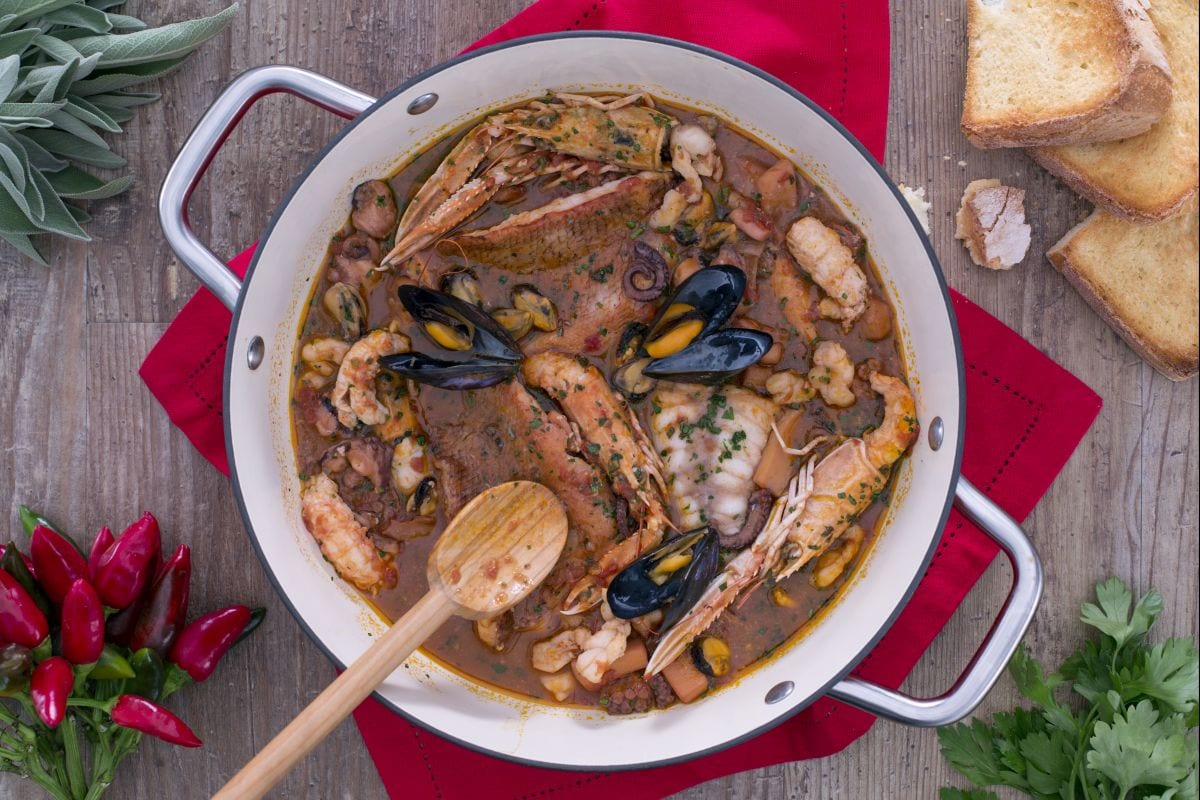Tuscan Cacciucco
- Very difficult
- 2 h 50 min

Rich flavors and a rustic, hearty feel make Cacciucco alla Livornese a standout in traditional family cooking—kids and adults notice the vibrant color, while home cooks love how the soft seafood pairs with a savory, robust broth. This classic Italian fish stew comes from Livorno, but it’s woven into so many American recipes these days because families like the big, bold taste and pretty presentation. Perfect for family gatherings, big Sunday dinners, or even a simple weeknight where everyone wants something satisfying, Cacciucco alla Livornese always delivers. The mix of fish stew and flavorful herbs combines for a moist bowl that feels super comforting, and there’s just something about the way the seafood blends with the subtle spice that makes people smile around the table. Families often add a side of fluffy garlic bread—DELICIOUS for dipping—which brings out all the best parts of this dish. Sometimes even picky eaters admit they come back for seconds thanks to the gentle heat and nice texture.
Busy families appreciate how Cacciucco alla Livornese doesn't need a special occasion to feel special; just serve it up when everyone needs a good dinner that both tastes great and looks good. It’s actually pretty versatile, since this Italian classic works at laid-back celebrations, casual parties, or even a cozy Friday night—plus, its great texture means it fits well with both American classics and traditional Italian fare. The deep, savory broth and mix of tender seafood give every bowl true comfort food vibes while still keeping things exciting for adventurous eaters. My family finds the best way is spooning the hot fish stew over toasted bread—AMAZING (and easy to serve!). Families enjoy that robust, satisfying flavor from Cacciucco alla Livornese over and over, especially when looking for reliable, flavorful, and good meals that bring everyone closer. Perfect when cozy warmth and a sense of tradition matter, this stew always seems to make every meal just a little more special.
You might also like:

To prepare Livorno-style cacciucco, start by cleaning the fish and shellfish you need: mussels, octopus, squid, cuttlefish, monkfish, scorpionfish, and langoustines 1. Clean and cook the mussels. After washing them under running water, remove all barnacles and pull off the beard emerging from the shell with a strong motion. Then, still under fresh running water, scrub the mussels vigorously using a steel wool pad or a stiff brush 2. Place the cleaned mussels in a pan and cover with a lid 3

and cook them over high heat for 5 minutes, or until they open 4. At this point, you can shell the mollusks 5, keeping a few whole mussels aside. Move on to the octopus. Clean it according to the tutorial, then coarsely chop the tentacles 6.

To clean the cuttlefish, you need to gently separate the head and tentacles from the mantle, wash them well, and remove the cartilage pen and the ink sac. Chop the tentacles 7 and heads 8. Proceed with the squid. Once the head is removed, locate the transparent cartilage pen inside the mantle and remove it gently 9,

then open the mantles like a book: remove the outer layer 10, cut them into strips 11, and reduce them to slivers 12.

Continue with the monkfish: remove the outer skin 13, divide the flesh following the bone 14, and fillet it 15, keeping the scraps aside.

Now scale the scorpionfish, remove the tail, and make an incision along the back 16, then remove the fins 17 and fillet it 18, keeping the scraps aside.

Remove the bones from the fillets with tweezers 19. Finally, clean the langoustines. With scissors, remove the tail 20, the legs 21

and the carapace 22, leaving the head intact and keeping all the scraps. After cleaning the onion, chop it and the celery, then mince the garlic clove 23. In a pot over moderate heat, place all the scraps: the monkfish bone, scorpionfish tail and fins, langoustine tail, legs, and carapace 24.

Add the chopped onion, celery, and garlic 25, then the whole peppercorns 26, and finally, deglaze with the white wine 27.

Add water and bring to a boil, then reduce the heat and continue cooking for 40-50 minutes: if necessary, remove the surface foam with a skimmer 28. Once ready, strain and filter the obtained broth 29, setting it aside. Continue with the cacciucco. Finely chop the onion, garlic, and chili pepper, then sauté them in a large skillet drizzled with olive oil 30.

Add the chopped octopus and cook for 10 minutes 31, then add the squid and cuttlefish 32 and continue cooking for another 5 minutes. Deglaze with white wine 33.

Season with salt and pepper 34, then add the previously crushed peeled tomatoes 35 and 1 cup of the fish broth obtained 36.

Cover the pan with a lid 37 and let it simmer over low heat for 1 hour and 10 minutes. When the fish is nearly cooked, gently add the monkfish and scorpionfish fillets, then add the langoustines 38. Continue cooking for 10 minutes, adding another 2 cups of broth and keeping the lid on the pan. After this time, add the shelled and whole mussels 39 and cook for the last 10 minutes).

Meanwhile, slice the bread 40 and toast it for a few minutes in the oven on grill mode, for 5 minutes. When ready, rub a clove of garlic on each slice 42, and finally add the chopped parsley to the cacciucco. The Livorno-style cacciucco is ready 43 to be served hot along with the toasted bread.